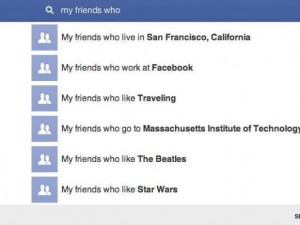‘Graph Search’? is the long awaited Facebook search engine that, according to Mark Zuckerberg, will be replacing the old white search box that many of us found no use for aside from finding Facebook friends. The new ‘Graph Search’? is now in beta and available to only a few select users. While some see this move as a major upgrade, others see it as Facebook once again pushing privacy boundaries. Zuckerberg coins this new method of search as ‘the new pillar of Facebook’? that will most likely change the way we view search in the years to come. Only the test of time will tell us if it can handle itself against the search engine titan that is Google.
Facebook is a social data warehouse that’s centered on people, photos, places and interests. Now with Graph Search and years of collected data, Facebook will become a multidimensional search engine. We will now be able to ask it complex questions that normally a search engine wouldn’t be able to answer like ‘Which restaurants do my friends like in Boston,” ‘Which of my co-workers are New England Patriots fans,” or ‘Which friends of my friends work in marketing, and graduated from BU.’? Recommendations are from actual people you know rather than strangers like when using Yelp, which has the ability to revolutionize word of mouth advertising. Zuckerberg also mentioned during the announcement that Facebook will be partnering with Bing to offer the best of both web and social search within the Graph Search results.

If it sounds too perfect to be true, it just may be. There is no question that Facebook has a long road ahead to perfecting their new search engine. Keep in mind, what mainly drives their search results are ‘shares’? and’?likes’? through users. This is asking every one of your friends and you to be diligently active on Facebook to ‘check in’? and ‘like’? places, post photos and fill out interests. Out of the hundred, or hundreds, or maybe even thousands of friends, who would you trust to give reliable recommendations? Think about how much thought we actually put into the ‘liking’? process. There are times where we all might have just ‘liked’? something for the sheer fun of it. Facebook will run into multiple obstacles along the way, but that’s the very reason why they are gradually giving access to a limited amount of users, collecting data and tweaking code, before making it public to everyone on Facebook.
So is this the start of the battle between Facebook and Google that many of us have been anticipating? Maybe not, Facebook foresees it as an evolution of the way we see search. Zuckerberg might have looked beyond becoming a competitor and begun the development of changing the game completely. Google and Yahoo! are not the only ones that should be raising an eyebrow, but other social sites like LinkedIn, Monster, Yelp and even Match.com need to realize that Facebook will challenge their livelihoods in their industries. If Facebook passes through the kinks and trials they are bound to face in the years to come, they could ultimately change the way we view and see the world as we know it, again.


